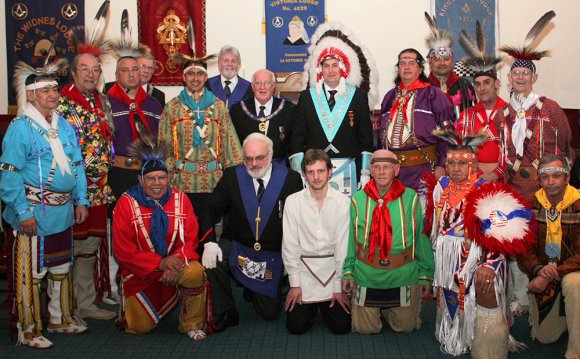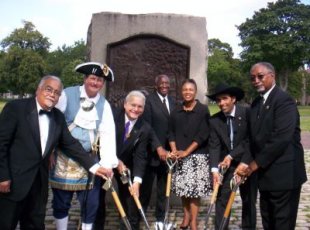
 Dedication from the Prince Hall Masons Monument at
Dedication from the Prince Hall Masons Monument at
Prince Hall, a local of Bridgetown, Barbados, West Indies, was freeborn on September 12, 1748, the boy of Thomas Prince Hall, an Englishman, and the mother, a totally free coloured lady of French heritage. In 1765, at age 17, Hall labored for his passage on the shipped to Boston where he grew to become a leatherworker. Eight years later he'd acquired property and it was qualified to election.
On March 6, 1775, Hall, now a minister having a Methodist Chapel in Cambridge, Massachusetts, became a member of 14 other free shades of black of Boston who all grew to become Masons at British Military Lodge, No. 58, then mounted on certainly one of General Thomas Gage's regiments positioned in Boston. Hall and yet another recently started Masons were granted the legal right to meet like a separate lodge, to march in parades, and also to bury their dead. They weren't granted permission to confer levels or perform every other Masonic work.
Nine years afterwards March 2, 1784, Hall petitioned the Grand Lodge of England, requesting a warrant for any Charter that they been refused through the whitened Masons of Massachusetts. The warrant was approved and Hall established the very first lodge of Black Masons in The United States referred to as African Lodge No. 459.
Even though the status from the Black Masons enhanced, they weren't considered a “full” Masonic lodge until 1787 when Prince Hall received a charter in the Grand Lodge of England, mom of Freemasonry. In 1787, African Lodge No. 459 grew to become African Lodge No. 1 with Prince Hall since it's leader. Also these Masons were now in addition to the U . s . Grand Lodge of England. They produced separate areas composed of mostly Black people. In 1791, the Prince Hall Grand Lodge began to control the 3 then existing black Masonic lodges with Prince Hall since it's first Grand Master, a situation he held until his dying in December 1807. Black Freemasonry developed in the establishment of the Grand Lodge.
Because of prevalent racism and segregation in The United States, it had been impossible for African People in america to participate most mainstream Masonic lodges before the late twentieth century. Yet, because Prince Hall Mason lodges were Black, United States Grand Lodges denounced Prince Hall Lodges and Prince Hall Masons, deeming them illegitimate and declining to acknowledge their authority. Until 1865 most Prince Hall lodges were within the North but following the Civil War, black Masonry rapidly spread over the South, frequently brought by Northern-born Masons who grew to become active in Renovation politics.
Throughout time of Renovation and ongoing to 1900, Prince Hall Masonry continued to be a very exclusive but small fraternity. Through the early twentieth century the membership quickly broadened, reducing its exclusivity. Although all Masonic Lodges today are theoretically racially integrated, whitened Grand Lodges in Mississippi, Florida, Arkansas, Louisiana, Sc, Alabama, Georgia, and Wv still don't recognize Prince Hall Grand Lodge people as legitimate Masons. Nevertheless the Prince Hall Masons include hundreds of 1000's of black and a few non-black people through the U . s . States, Canada, the Bahamas, and Liberia.
Sources:
William H. Grimshaw, Official Good reputation for Freemasonry (New You are able to: Negro Colleges Press, 1969) William A. Muraskin, Middle-class Shades of black inside a Whitened Society: Prince Hall Freemasonry in the usa (London: College of California Press, 1975) Prince Hall Freemasonry by Bro. George Draffen, Deputy Master, Grand Lodge of Scotland,
YOU MIGHT ALSO LIKE












